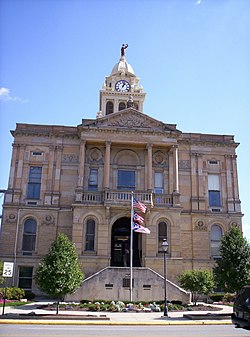Marion County Courthouse (Ohio)
Marion County Courthouse | |
 Western front of the courthouse | |
 | |
| Location | Courthouse Sq., Marion, Ohio |
|---|---|
| Coordinates | 40°35′20″N 83°7′42″W / 40.58889°N 83.12833°WCoordinates: 40°35′20″N 83°7′42″W / 40.58889°N 83.12833°W |
| Built | 1884 |
| Architect | David W. Gibbs |
| NRHP reference No. | 74001572[1] |
| Added to NRHP | July 25, 1974[1] |
The Marion County Courthouse is the seat of government for Marion County, Ohio, United States. Located at the heart of the city of Marion, it is a sister of the courthouses that stand in Washington Court House in Fayette County, Ohio, and Charlotte, Eaton County, Michigan. All three were designed by architect David W. Gibbs. The Fayette County Courthouse was built during 1882–1885, as was the one in Eaton County Michigan, which uses brick and stone for its exterior rather than stone for the Ohio built structures. The Marion County Courthouse was built during 1884–1886. The blueprints are a modification from even older designs for the Henry and .[citation needed]
Ten portholes are decorated with sandstone heads of various figures. Four of them are meant to depict various races—a white woman, an African man, an Asian man, and an American Indian man. Other heads include two settler girls and a settler woman, plus a head similar to depictions of William Shakespeare.[2]
In the 1970s, county officials announced a plan to perform extensive changes the building's interior, which had previously experienced few modifications since construction. The Marion County Historical Society protested the plans and aroused substantial public displeasure; preparations were made for a referendum to repeal the plans, and enough local residents signed a ballot petition that it would have qualified for a vote, but no vote was held because Ohio law does not permit referenda of the sort. Numerous original wood carvings and paintings were destroyed, ceilings were dropped, and aluminum doors installed. County officials sought to mollify local ire by retaining the building's exterior, including restoring the statue of Justice atop the tower.[2]
References[]
- ^ Jump up to: a b "National Register Information System". National Register of Historic Places. National Park Service. April 15, 2008.
- ^ Jump up to: a b Thrane, Susan W., County Courthouses of Ohio. Bloomington and Indianapolis: Indiana UP, 2000, 103.
- Courthouses on the National Register of Historic Places in Ohio
- Buildings and structures in Marion, Ohio
- National Register of Historic Places in Marion County, Ohio
- County courthouses in Ohio
- Government buildings completed in 1886
- Clock towers in Ohio




